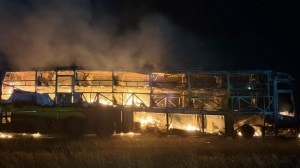He has been emboldened by that one act of his son Somvir Singh — to ride a mare on his wedding day on March 3 and do the ghurchari, a pre-wedding ritual where the groom sets off on a procession to the village temple or the well to pray. The procession had turned violent that day, with the upper-caste Rajputs of the village clashing with the Dalits, an incident that was raised in the state Assembly and led to police being deployed in the village for a month after.

Sagga, 15 km from Karnal town, is a village of 6,500 people, with the Rajputs making up 60 per cent of the population. Like in other villages in these parts, there is a separate well for the Dalits while the other villagers share a common well.
Story continues below this ad
“Two years ago, the upper castes had thrown a Valmiki youth off the mare. After that, no Dalit had dared to perform the ghurchari,” says Phool Singh.
Then his son Somvir decided to challenge that. So at 7 pm on March 3, the 29-year-old slipped into a black suit, wore a red turban, straddled a white mare and set off in a buggy to the community well of the Dalits.
Somvir, who works as an executive assistant in a government-administered cooperative society in the neighbouring town of Kurukshetra, says the upper castes started threatening the buggy owner much before the procession set off, telling him the Dalits were not allowed to perform ghurchari. “They did not want me to ride a horse up to our well, which is just 200 metres from our house,” he says. “When our procession finally began, a Rajput youth jumped at me with a stick in his hand, but our community members stopped him. Then, they cut off electricity to our part of the village. After some elders intervened, we decided to postpone the ghurchari for the following morning.”
The next day, with members of Dalit organisations rushing to Sagga to support Somvir, his ghurchari procession set off under police protection. “But when I was returning after the ghurchari, the Rajputs attacked us again. Some of our vehicles were damaged and the DJ party ran away,” he recalls.
Story continues below this ad
Somvir’s mother Chanderpati says, “I hid my son in our Ravidas temple to protect him.” Later, Somvir went to the house of his bride Meenu Bhoria, in Ambala, accompanied by a police team, and completed the wedding rituals.
On March 6, his father Phool Singh named 42 Rajputs for attacking their family and stopping them from performing Somvir’s ghurchari.
A day later, after the Opposition raised the matter in the Assembly, Chief Minister Manohar Lal Khattar sent Haryana Minister of State for Social Justice and Empowerment Krishan Kumar Bedi and local MLA Bhagwan Dass Kabirpanthi to the village to resolve the dispute. Union Minister of State for Social Justice and Empowerment Ramdas Athawale also reached Karnal, after which both parties reached a compromise — the Rajputs apologised and Somvir’s family agreed to withdraw the FIR.
Two months later, villagers on both sides admit it’s only an uneasy truce.
Story continues below this ad
While the Rajputs claim that no one, including the upper castes, have been carrying out ghurcharis since the village panchayat passed a resolution a few years ago against the practice to avoid tension in the village, the Dalits say the upper castes continue to practice it while stopping the lower castes.
Shakti Singh Chauhan, a Rajput in Sagga, claims, “They misused the SC/ST (Prevention of Atrocities) Act and named even those who were not present in the village when the incident occurred.”
While denying the charge, Somvir says the fight isn’t over. “If all other caste members perform ghurchari, why can’t we Dalits? We did not fight for ourselves but for our future generations,” he says.
His mother Chanderpati adds, “After that incident, I have also started participating in protests whenever cases of atrocities on Dalits come to my notice. A few days ago, I went to Karnal to attend one such protest.”

 Somvir explains how his ghurchari, a wedding ritual, was disrupted by the Rajputs, as his parents look on, at their home in Sagga village, Karnal. Express Photo by Jaipal Singh
Somvir explains how his ghurchari, a wedding ritual, was disrupted by the Rajputs, as his parents look on, at their home in Sagga village, Karnal. Express Photo by Jaipal Singh






